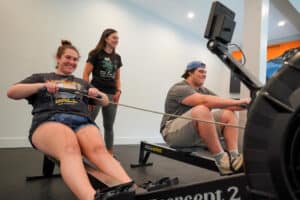What is anxiety?
Anxiety disorders are a group of disorders that are characterized by intense, excessive, and continuous worry and fear about typical everyday situations. Many young adults with an anxiety disorder are so scared and stressed that they are not able to function properly. Anxiety impacts the way that young adults feel and behave. These feelings and behaviors are typically negative and disrupt the life of the young adult as well as those who care for them. Symptoms can interfere with job performance, school performance and relationships.
Occasional anxiety is a typical part of life. When young adults have a problem at home or need to make an important decision, feeling anxious is common. Anxiety disorders involve more than temporary worry or fear. For a young adult with an anxiety disorder, experiencing anxiety does not go away and often becomes worse.
According to the U.S. Department of Health and Human Services and the National Institute of Mental Health, the five major types of anxiety disorders are:
- Generalized anxiety disorder – chronic anxiety, exaggerated worry and tension (even when unprovoked)
- Obsessive-compulsive disorder (OCD) – recurrent, unwanted thoughts (obsessions) and/or repetitive behaviors (compulsions). Repetitive behaviors such as hand washing, counting, checking or cleaning are often done with the hope of preventing obsessive thoughts or making them go away. The behaviors only provide temporary relief and refraining from performing them greatly increases anxiety.
- Panic disorder – unexpected and repeated episodes of intense fear accompanied by physical symptoms that may include chest pain, heart palpitations, shortness of breath, dizziness, or abdominal distress.
- Post-traumatic stress disorder (PTSD) – may develop after exposure to a terrifying event or ordeal in which grave physical harm occurred or was threatened. Traumatic events that may trigger PTSD include violent personal assaults, natural or human-caused disasters, accidents, or military combat.
- Social anxiety disorder – overwhelming anxiety and excessive self-consciousness in everyday social situations. Can be limited to only one type of situation (public speaking, eating in front of others, etc.) or may be so broad that a person experiences symptoms almost anytime they are around other people.
Common signs and symptoms
Various anxiety disorders present with varying signs and symptoms. Each young adult is unique and may have symptoms that are different than those present in a child or an adult. Many of the common signs and symptoms include:
Behavioral:
- Procrastination and avoidance of certain activities are signs of an anxiety disorder.
- Compulsive or repetitive behaviors like hand washing multiple times is a behavioral symptom of anxiety disorder.
- Profound shyness and extreme resistance to change can be signs of anxiety.
- Exaggerated startle response or being easily scared can be a behavioral sign of anxiety.
- Extreme dependence or clinginess can be a behavioral sign of anxiety. On the other hand, social withdrawal or isolation and difficulty making friends are also symptoms.
Cognitive:
- Detachment from surroundings can be a self-preserving sign of an anxiety disorder.
- Ritualistic thinking often occurs due to anxiety.
- Having difficulty concentrating, mind going blank, and the inability to make decisions are cognitive signs of anxiety.
- Nightmares or night terrors can be signs of anxiety.
- Fleeting ideas, racing thoughts, and difficulty controlling feelings of worry are symptoms of anxiety.
Physical:
- Trembling or shaking and feeling restless or on-edge are physical signs of anxiousness.
- Being easily fatigued and having muscle tension can be symptoms of anxiety.
- Having a fast heartbeat, lightheadedness, rapid breathing, and sweating are physical signs of anxiety.
- Stomachaches and headaches
- Having sleep problems including difficulty falling or staying asleep and unsatisfying sleep can also be signs of an anxiety disorder.
Psychosocial:
- Depression, ongoing panic and fear, and feelings of hopelessness or impending doom are symptoms of an anxiety disorder.
- Unpredictable mood, ongoing nervousness, and irritability are signs of anxiety.
- Fear of dying or being out of control and fear of embarrassment or of making mistakes can also be indications of anxiety.
Stress and anxiety
Young adults may use the terms stress and anxiety interchangeably because they have many symptoms in common. Both stress and anxiety can impact the mind and body, causing symptoms like:
- Excessive worry
- Uneasiness
- Tension
- Headaches or body pain
- High blood pressure
- Loss of sleep
Stress is different from anxiety in that it is generally a response to an external event such as arguing with a family member or taking a test. Once the situation is resolved, the stress goes away. Stress is also unique in that it can be positive or negative. It can push young adults to study for the test or it may cause them to lose sleep.
Anxiety is different from stress in that it is generally internal, meaning that it is the young person’s reaction to stress. Anxiety usually is accompanied by persistent feelings of dread or apprehension that will not go away, interfering with daily living. It is constant, even if there is no immediate threat.
Just as everyone can experience occasional anxiety, everyone experiences stress. Oftentimes the stress can feel overwhelming for young adults. They may be at risk for an anxiety disorder if it feels like they cannot manage the overwhelming stress and if their symptoms seem to always be present, interfere with their daily life, or cause them to avoid doing things.
Coping with stress and anxiety
Young adults can reduce stress by learning what causes or triggers it. They can help reduce anxiety by applying various coping techniques through trial and error. Many young adults try the following activities:
- Regular exercise
- Eat healthy, regular meals
- Identify and challenge negative and unhelpful thoughts
- Stick to a sleep routine and make sure to get enough sleep
- Utilize relaxation exercises – phone apps provide deep breathing exercises and tips for practicing mindfulness (paying attention to the present moment)
- Avoid excess caffeine
- Keep a journal – there are many helpful resources including gratitude journals
- Communicate with friends and family who can help and listen
When to get more help
It may be time to seek help if a young person is struggling to cope or if the symptoms of their stress or anxiety will not go away. That’s where Skyterra comes in. Young Adults ages 18-29 experience a supportive, therapeutic environment where individual attention and personal needs are addressed. Our program teaches young adults how to plan for and live out the vision for their future, providing lifelong direction and identifying their purpose so that they can live the life they were meant to live.
Who we are
Skyterra Young Adult is a therapeutic program that teaches confidence-boosting tools and strategies that can be immediately applied in daily practice. Program focus areas include nutrition, fitness, life skills, and mental health. Skyterra includes and emphasizes:
- Opportunities that establish intention and purpose in independence
- Stress management
- Private therapy and coaching
- Creating and eating balanced meals
- Structured classes and an active schedule
- Consistent movement with plenty of nature and adventure
- Hands-on integration of healthy life skills, including education and career planning.
Skyterra guests are able to unplug and ground themselves so they feel less overwhelmed and more balanced. Through lectures and the progress that accompanies dedicated time for self-care, guests increase their self-awareness, develop new coping skills and mechanisms, and gain a clear understanding of mindfulness and its effectiveness. In addition to the yoga and fitness classes, specific stress-management offerings include:
- Joyful movement – guests work to find a form of movement that brings joy, such as mindful walks, hikes, mobility classes, yoga or Tai Chi
- Lectures – Skyterra experts address topics including self-care, self-compassion, sound sleep, building boundaries, cultivate gratitude, and reclaiming your body
- Meditation and mindfulness – reduce stress and slow down the nervous system through a variety of experiences including creative arts and journaling classes, mindful eating experiences, walks and hikes
- Calming breathing techniques – explore calming and grounding deep breathing techniques that aid in stress reduction including belly breathing, square breathing, and relaxation breathing
- 1:1 therapy sessions – confidential and emotional support provided by one of our licensed clinical therapists
By focusing on the mind, body and soul, our experts meet young adults where they are in their relationship with stress. Set aside life’s obligations and commit to unplugging, relaxing, and breathing easy at Skyterra Young Adult.






